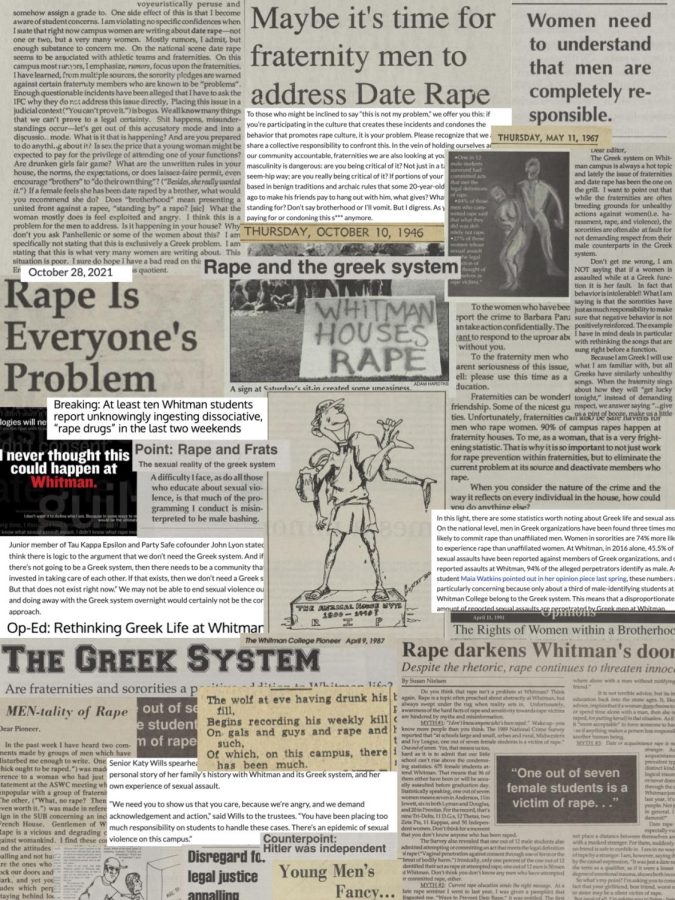Dear Whitman Community,
We are writing because we believe there has been a misunderstanding with regard to the faculty address at convocation this year.
Our concern about Professor Elyse Semerdjian’s speech was not due solely to its content. We recognize that conversation regarding Israel/Palestine and other conflicts is important both in and out of the academic setting at Whitman. We were primarily concerned with the forum granted to the speech. This concern is twofold. First, attendance at convocation is required of first-year students. It serves as a pivotal event during orientation for this reason. It is our opinion that a one-sided lecture on an emotionally and politically charged and complex topic, such as the conflict in Israel and Palestine, without the presence of a contrasting opinion, any chance for Q&A, or open discussion, is inappropriate at an event required for all first-year students. Our second concern stems from our understanding that Convocation should serve as a “welcome to Whitman” event. The choice to feature a talk that was so divisive was not welcoming to everyone. It left some Jewish students feeling alienated, unsupported and singled out.
We would also like to clarify that we did not initiate Hillel’s involvement in the creation of principles for future convocation speakers and we are not following through on President George Bridges’ offer. Furthermore, and as we understood the President’s proposal, the goal of these non-binding, advisory principles was never to censor or infringe upon academic freedom.
Finally, members of Hillel Shalom, and Jews in general, voice a wide range of differing views and opinions. We hope this letter provides insight into the critique we bring to this year’s convocation speech. We bear no ill will toward Professor Elyse Semerdjian or her opinion. Academic freedom and meaningful dialogue are aspects of our time at Whitman upon which we place an unsurpassed value.
Please feel free to contact the signatories below. We are always open to meaningful dialogue, differences of opinion and shared efforts toward mutual understanding.
Sincerely,
Eliana Schwartz, Sabra Jaffe, Asher Jaffe, Hannah Snyder, Deborah DeHovitz, and Lauren Rekhelman



Ðаклин • Nov 14, 2014 at 3:50 pm
Both concerns expressed in this letter are valid and yet shortsighted. Yes, sitting through the convocation speech is mandatory; yes, Prof. Semerdjian presented a “one-sided” narrative of colonialism (and dare I say it, genocide?). But it is cruelly ironic to complain about feelings of victimhood at Whitman’s wecloming ceremony. Israeli occupation is not optional for Palestinians, it is imposed upon them. They were not invited to attend by their own free will and they do not have the option to get up and leave when they feel uncomfortable. As for a “one-sided” narrative without the opportunity for students to pose questions or challenge facts–this is precisely the kind of narrative about the Israel-Palestine conflict that dominates American politics. If anything, Semerdjian’s speech was a response to this one-sided narrative, showing students a framework through which our nation fails to consider this conflict. You will notice Whitman has no Palestinian activist group on campus to write letters to the administration or publish opinion pieces in the Pio..this is indicative of the power discrepancy between the people involved in this conflict and their narratives.
Furthermore, the fact that students and the administration fail to draw a distinction between Jews, Israelis, and Zionists indicates that a detailed and nuanced narrative of this conflict NEEDS to take place. While certain members of the audience may have been offended by the convocation speech, it is incorrect to consider an attack on the state of Israel an attack on Jewish students and families in Walla Walla. Not all Jews are Zionists. Not all Israeli’s are Jewish (or Zionist).
But enough of that. I do not think it was Prof. Semerdjian’s intention to demonize Israel or Jewish families; she wanted to draw our attention to the fact that all of us at Whitman are here because we are reaping the benefits of colonialism and genocide. Yes, of that we are all guilty. Yet no one seems ashamed or uncomfortable. And Ironically, contributing to this system IS optional…is anyone getting up and walking out?
Hasan • Nov 14, 2014 at 12:31 am
Throughout this controversy, I found it really interesting how Professor Semerdjian’s “opinion” was seen as an attack on Jewish students, making them feel “alienated, unsupported and singled out,” rather than a scholarly discussion based on scholarly sources about the context of where not only the professor herself is teaching, but also where new students are going to be spending the next four years of their lives. It is astounding that absolutely no one mentioned the Native American lives, homes, and way of life that has been savagely demolished and razed to the ground so that all of us (buildings, faculty, staff, administrators, students, etc.) can be here, directly benefiting from what happened (has been happening and is happening) to them. Since we reap the benefits, it is not just an appropriate “Welcome to Whitman” speech, but an absolute necessity so that all students know their complicity in the suffering that took place (has been taking place and is taking place) to build and maintain this institution. Of course, I am not writing to diminish the discomfort that some Jewish students felt during Professor Semerdjian’s speech, but claiming that it is “inappropriate” as a mandatory welcoming speech for all the first-year students is absolutely unfounded.